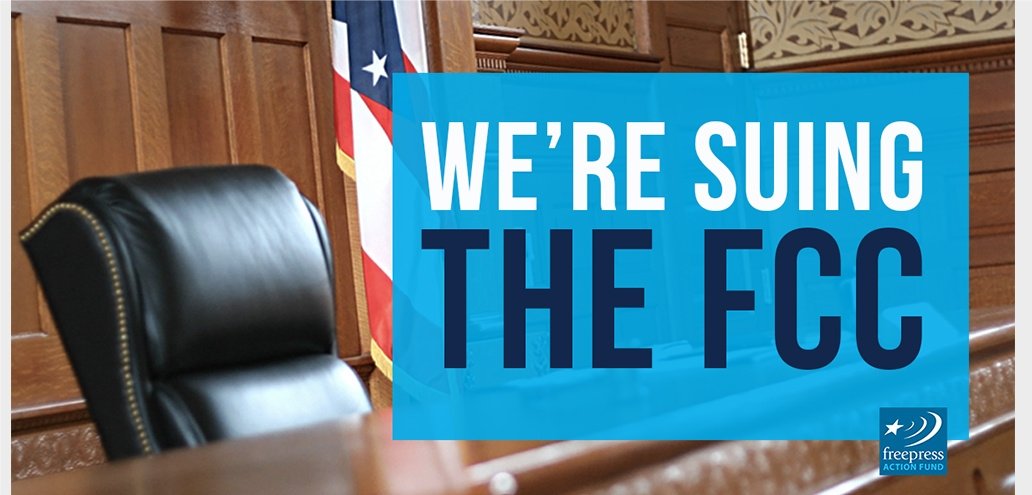We're Suing the FCC. Here's How It Works.

We’re taking the FCC to court.
We’re not alone: Right after Chairman Ajit Pai and his Republican colleagues voted to destroy Net Neutrality last week, attorneys general from at least nine states plus the District of Columbia indicated their own plans to sue, with New York State Attorney General Eric Schneiderman leading the charge.
The goal: to restore the Net Neutrality rules and their strong foundation in Title II of the Communications Act.
Here are the answers to questions you might be thinking about.
Are the Net Neutrality rules already gone?
They’re still in force, but not for much longer.
As soon as the FCC publishes its so-called “Restoring Internet Freedom Order” in the Federal Register and gets final approval for its decision, companies like AT&T, Comcast and Verizon will be free to block or discriminate against any content, apps and online services they choose.
That includes any political speech they disagree with — a disturbing prospect given how many basic rights are under attack right now.
How soon can you win a legal victory and end this nightmare?
The soonest Free Press can file in court is after the order is published, either by the FCC itself or in that Federal Register. (There are some complicated timing rules that can apply differently to different parts of the FCC’s vote, so that’s why there’s some flexibility.)
Once that publication happens, we’ll file within 10 days — a timeframe set for making a first appearance and starting the process to determine which federal appeals court will hear the case. Wherever and whenever we go, this first filing will just be an initial declaration of our intent to seek a review of the FCC’s actions in that appeals court.
There are likely to be several challenges, or maybe even several dozen, and they could be filed in different courts.
Once the challenges all get consolidated into a single case and courtroom, and this procedural phase is over, that’s when there will start to be consideration of the merits — or rather, the lack thereof — in what the FCC did.
What happens after that?
Next we’ll file our brief, which will present our argument for why Title II and the Net Neutrality rules built on it should be restored.
This filing will probably happen in May or June at the earliest, but the timing depends on the procedural phase discussed above — how many parties there are in the case, how long it takes to choose the venue for the litigation, and how easy it is to settle any procedural arguments that may come up during that shaking-out period.
So are you filing your own lawsuit, or are you collaborating with other groups or with the attorneys general from these states that are suing?
In these big appellate cases over federal-agency decisions, every challenger still tends to file its petition for review on its own or in small groups. But after the initial flurry of filing these preliminary requests, the court tends to group together the parties on each side of the issue.
Either way, whether all of the parties challenging the FCC’s ruling are part of one brief or several, we’ll definitely talk to, coordinate with and collaborate with all of the other parties that share what the courts call a “common interest” in the case.
OK, so what happens after you file your brief?
We’ll make our oral arguments, probably in the fall, but again the timeline could speed up or slow down depending on the pace the judges set. Appeals courts don’t have juries; instead, cases are typically heard first by a panel of three judges.
During oral arguments, we’ll present a detailed overview of the arguments we made in the briefs, explaining why the FCC was wrong to overturn the Net Neutrality rules.
We’ll discuss the legal framework of Title II, and how this FCC read the law wrong.
We’ll talk about the agency’s mistakes in taking away the rules. We’ll skewer Chairman Pai’s deeply flawed legal reasoning on several points. We’ll highlight how he refused to even consider any evidence that contradicted his (false) claim that the Net Neutrality rules harmed investment.
And we’ll also focus on process fouls in the FCC’s rulemaking, like how the agency took no action even after it became clear that fake and fraudulent comments had been submitted — some using the names of people who are no longer alive.
All in all, we’ll underscore his absolute contempt for public input from the millions of people across the country who fought to preserve the rules.
The court could deliver its ruling by the end of 2018 or the beginning of 2019, but it all depends (once again) on how fast the judges speed the process along.
I’m freaking out. What are our chances in court?
We’ve got a very strong case. The rules the FCC just gutted were based on Title II of the Communications Act, which is the strongest possible legal foundation for Net Neutrality, and it’s also the right law for broadband internet access.
It’s the best reading of the legal definitions that Congress applied to communications services and technologies, and the Pai FCC had to do some serious gymnastics to pretend otherwise. And the agency was in such a rush to make that disastrous decision that it made a bunch of procedural mistakes and unforced errors along the way.
We’ll use all of that in court to restore the rules and return to the right law.
This will be a long battle, so chip in whatever you can to help fund the fight. Thank you!